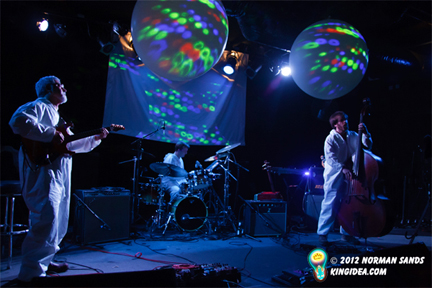
Photo by Norman Sands
Arriving at Martyrs’ like a solar wind from the most recent coronal mass ejection, MathGames is a pairing of three phenomenal musicians with Professor Fareed Haque at the lead. MathGames is striving to blend the style of Jazz with the musical possibilities presented by modern instrumentation. Alex Austin’s double bass provides a solid jazz platform that Fareed can work his phrasings into, while Fareed’s Moog guitar and Greg Fundis’ acoustic and electric drum kit open up new frontiers for the time honored genre.
Fareed’s talents are uniquely suited to the Moog guitar, or maybe the Moog guitar is uniquely suited to Fareed’s talents. The guitar allows him to play a chord with three of the strings and while that chord sustains indefinitely Haque can play a jazzy run on the other three strings. The advanced instrument allows the jazz great to play with more than one voice at a time. Fareed may have a powerful ally in the form of his Moog guitar, but he was willing to lay it down and switch to one of his two acoustic guitars when the moment called for it. He also added his own beats to Fundis’ with vocal tabla rhythms.
Fundis’ electric drums can sound like they are bouncing off the moon before reaching the audience’s ears or they can pierce through the air like lasers at the speed of light. Greg does a great job of balancing the styles of acoustic jazz trap drumming with electric percussion. His acoustic solos are clean and articulate, using the digital pads to spice his rhythms. He has a connection with Austin that creates a playground for Haque.
Alex almost exclusively uses a double bass, sparingly utilizing his electric bass. He didn’t use a bow during the show, relying on his fingers to set the long strings of the upright in motion. Always playing with a smile on his face, Austin’s grooves are energetic regardless of tempo. At one point in the show, Alex played a solo over Fareed’s arpeggiations with his upright’s signal fed through a wah pedal, the effect was smoother than silk.
Two white orbs were hung above the stage, awaiting the psychedelic work of Craig Pessolano’s projections. Craig really knows what to do with colors, he completed a five row rubik’s cube in about five minutes before MathGames’ set. Awaiting the beginning of the performance, twin planets rotated on the orbs. Throughout the show, the projections not only provided a stimulated image but also influenced the mood in the room in the way that LED effects lighting can.
Towards the end of the show, Fareed asked opening act Mos Scocious, a jazzy Chicago funk trio, to come to the stage. Bradley Butterworth sought out his hollow body guitar, which was still pugged into his amp, while Josh Rosen (bass) and Robert Dicke (drums) relieved Austin and Fundis at their stations. Playing with this outfit, Fareed had a more lively feel, matching the uptempo approach of the trio’s sound. After doing a song with Mos Scocious, Fareed asked Marcus Rezak and Jared Rabin of The Hue to make their way to center stage.
The jam that ensued featured four guitarist with Fareed clearly leading the way; all four have great jazz chops and traded turns soloing over the mammoth pocket that Austin and Fundis provided. Also on stage for this song was Jesse Clayton (keys) of the Macpodz, playing a Dave Smith synth he had just aquired at the NAMM musical instrument trade show in Annahiem. While he didn’t take a solo, Jesse’s contributions further expanded the musical stratosphere of the jam. Such efforts echoed the broader intents of the band as a whole, which kept the music soaring.


No Comments comments associated with this post